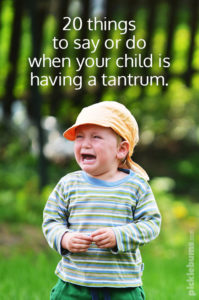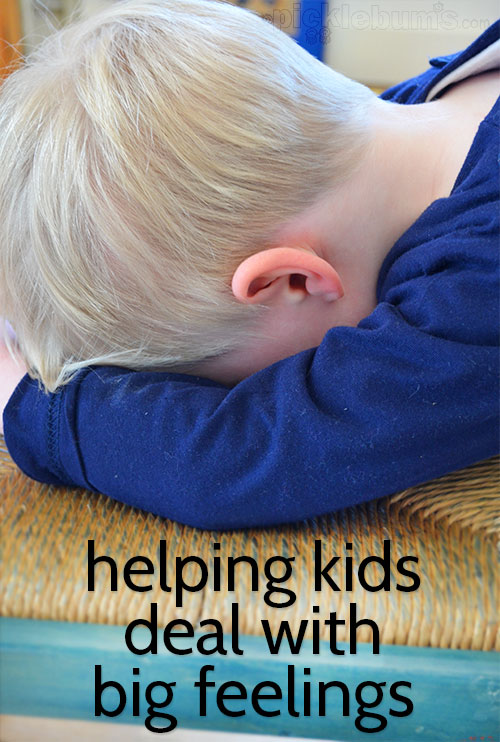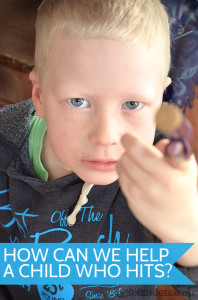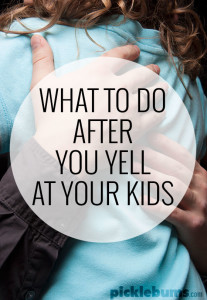One of the biggest struggles we have as parents is how to keep our cool, and help our kids deal with big feelings.
It’s not always easy to manage our child’s big emotions when we are often dealing with our own at the same time, but it is so important to help our kids learn to manage their big feelings and develop self regulation skills.
These five doable ideas will help you be a more patient parent, and teach your kids how to deal with big feelings.
As a parent I am working not squashing my kid’s difficult or negative feelings. I am working on not taking my kids feelings personally. And I am working on sending the message that it is ok to feel angry, sad, selfish etc. These ideas are all about how I personally deal with my children’s big emotions but as parents we also need to teach our kids how to deal with their own big feelings.
Helping our kids learn self regulation doesn’t mean that you are trying to avoid your kids ever having big, difficult, or negative feelings. It means that you let your kids feel whatever they feel, AND help your children learn to understand, acknowledge and manage those big emotions in positive and healthy ways.
So today I am going to share a few ways we are working on helping kids deal with big feelings.
Five Ways to Respond to your kids Big Feelings.
While kids feelings may seem a bit over the top to you, or you might even feel like they are throwing a tantrum for no reason, these emotions are real to our kids and happen for a reason.
It’s useful to remember that our kids are people, with valid feelings, just like we are, but they are not mini adults. Kids are less mature in all areas, that makes them more sensitive to things that adults might otherwise brush off, and they have less ability to cope with stress and distress.
The main way children learn self regulation is through co-regulation with a trusted adult, so while trying all these ideas for responding to your kids big feelings the number one thing you need to remember is to use all these ideas on yourself to help you manage your feelings and remain calm and patient.
1. Help kids recognise their big feelings
The first thing we do at our house when big feelings happen is to say them out loud with a simple ‘say what you see’ statement.
“It looks like you are feeling… angry/sad/frustrated/furious/upset/overwhelmed”
Saying out loud what emotions you are seeing is a great way to help your child recognisee their emotions in a non-judgemental, non-threatening way. It builds their understanding of emotions and helps them feel heard and validated and builds their emotional vocabulary.
You can also say what physical sensations that might be accompanying the feelings to help kids link the feeling to the sensations they feel in their body – eg “It looks like you are feeling angry, I can see your whole body is tight and tense”
2. Give kids words to express their big feelings.
Helping children express their emotions through words is one of the best ways to help them deal with the emotion and deescalate the situation.
This is as important for an older child who you may think already has a good emotional vocabulary, as it is for a preschooler who doesn’t have as much self awareness or expressive language. Sometimes when you are feeling stressed it is hard to express what you are feeling, and hard to make others understand – so don’t skip this step because you think your child should be ‘old enough’ to do this already.
Putting feelings into words helps everyone understand what is going on, without assumptions or judgements.
Using an ‘I messages’ is a simple way to express feelings without blame – eg. “I feel ____ when _____ happens.”
This is the goal we are working towards is for our kids to be able to give a simple statement of their feelings and why they feel that way. But when you are in the moment, and there is yelling, and tears, sometimes it’s hard to stop and find the words, even for us adults. So this is the time to step in and prompt, or say it for them.
When I need to help my kids find the words I sometimes turn the ‘I message’ into a question – eg. “Do you feel ______ when ______ happens?”
Do you feel angry when your brother takes the Lego you wanted?
Are you feeling frustrated because you can’t watch the TV show right now?
Do you feel sad because your sister is angry with you?
And for those times when even answering a question is too much, I take a guess and say what I think might be going on using a modified I statement – eg. “You feel ____ when _____ happens.”
Even if we get it wrong, we are still letting our kids know that we trying to understand and we are modelling the language skills we are working towards our kids using so they can self regulate.
This feelings chart for kids is another way to help kids learn to recognise and name their emotions. They might be able to point to a picture to show you have they are feeling if they are not able express their emotions verbally.
3. Offer kids an appropriate way to express their big feelings.
While we are working on not squashing our kids feelings, that doesn’t mean we will allow them to behave inappropriately. Acknowledging and allowing your children’s feelings doesn’t have to change a limit you have set for their behaviour.
In practice this might sound like –
“It’s ok to be angry with your brother, but it is not ok to hit him.”
“It’s seems like you are really frustrated, but it is not ok to speak unkindly to people.”
“It is ok to feel cross about having to do the job, but you still have to do it.”
The message we want to give our kids is that it is ok to have big feelings, but how we deal with them is important. Though simply saying those things is usually not enough.
When you are angry and every muscle in your body is tense and you just want to lash out, being told it is ok to feel that way but being stopped from actually lashing out, doesn’t magically take that anger or those feelings away. Our kids are still mad, they are still tense, they still want to hit something. So try to offer an alternate way to express their anger or getting rid of that wound up feeling.
You can go punch your pillow.
You can talk about it with me.
You can go kick a ball really really hard.
You can go outside and yell at the trees.
You can write or draw about how you feel.
4. Help kids calm down after big feelings.
So you have identified your child’s big emotions, helped them to verbalise them, and suggested ways to express those feelings safely, even after all of that, your child might still need help to calm down and reset.
For some kids, just going off to yell outside is enough to help them calm down, but some kids really struggles to get control of their big feelings, even when they want to. We need to teach those kids ways to find ways to calm down so they can move on.
For some kids, spending time alone, or snuggled up with you may be just what they need. Others might need some heavy work activities for kids (this list is great because these ideas can all be done in small spaces) to give them some proprioceptive input which can really help to calm an reset some kids.
And for other kids some calm down breathing exercises might be useful.
When one of my kiddos couldn’t calm down after some big emotions we used to play a game called ‘Blow Me Away’. After he’d had a good cry I would hug him and whisper in his ear “Blow me away!” Then I’d pull back, take a comically deep breath and attempt to blow right into his face. He would immediately laugh and try to avoid my breath and then he would try to blow into my face. It’s a little gross, but it works!
For something a little less gross, try these 28 Printable Breathing Exercises Cards for Kids.
5. Set a limit, then gently redirect.
For some kids, doing all of the above is great, and wonderful and helpful, but sometimes those things don’t help your child deal with, and then let go of their big feelings.
For some kids, and I have one of them, the raging and crankiness can go on and on and on even after you have talked about their feelings, and helped them channel them into more appropriate behaviour, and given them a chance to calm down.
I’ve tried letting my rager go, giving her space to just yell and cry and be cranky, but experience has shown me that this doesn’t actually help her, and often just makes things worse. Once she gets past a certain point it is like she can no longer see a way out, she can’t calm down and that makes her feel worse and the anger and sadness just compound the longer it goes on.
For that child I need to set a firm limit and then gently redirect.
“You’ve had 30 minutes to be angry and get your feelings out, now it is time to move on.”
‘Moving on’ involves finding something else to do on your own, or being given a task to do (for preschool age or younger kids just offer a choice of two things you know they would like to do).
The tasks I offer are always something that involves physical movement, but not a lot of thought. I have found things like building lego, or folding washing, or drawing, or walking to the letter box – something that involves the child’s physical body but is easy for them and doesn’t take much thought or effort (these heavy work activities for kids are great for this too). This gives the child an opportunity to fully engage in a new task while redirecting their attention and slowly letting their anger or sadness ebb away.
More Resources and Ideas
I don’t know about you but I am always glad to find out I am not alone when dealing with these parenting struggles. Here are some stories and helpful ideas from other parents and professionals.
Free Calm Down Printables
Helping Children Manage Big Emotions – free printable poster
Fostering Emotional Literacy in our Children.
Helping Children Recognize and Practice Kindness in Speech
When Extreme Emotions Take Over a Toddler
And here are a few more helpful ideas and stories from me:

Print a poster with some practical ideas for things to do when your child has a tantrum or meltdown.
There are loads more of great blog posts and resources online for helping kids deal with big emotions. I’ve listed my favourites above but I’d love you to share your ideas and links in the comments too.




Great post Kate. We do lots of these things in our house too. We also have a set of emotion books by Trace Moroney (When I’m feeling angry, When I’m feeling jealous, When I’m feeling lonely etc) that helps very young kids to put a word to the feeling and understand that these feelings are ok.
Hi Kate, Wow I love this post and it is so encouraging and helpful. I just want to let you know that I have included it in my latest link magazine The Beast – All That Is Beautiful so my readers can come across and read this article. Such an important issues for us parents to help our little ones deal with the craziness of this world, the unplanned and unexpected of this world and growing up. Thank you so much and I hope you get some lovely visitors. xx http://www.elizabethkfindlay.com/2013/09/the-beast-all-that-is-beautiful-link.html
As a speech therapist, thank you for these tips! So many of my little ones (I work with preschoolers) have trouble with emotions- we talk about them a lot.
May I also suggest for the “ragers” maybe a sensory activity to help calm down and distract them? Things like playdough, moon sand, oobleck, slime, glitter jars…these sorts of activities may help a child to calm down (at least in my experience, it’s worth a try!)
yes, I have found that an offer of real, physical WORK after a meltdown (when they\’ll do it!) returns a sense of mastery and control => calm, happy kid.
What I struggle with is finding the line between empathy and setting limits on behavior – my 6yo gets just plain mean sometimes (horrible stuff with no relation to reality, said only to verbally attack), and I know it\’s a bid for connection in response to being overwhelmed, but how… ?! The only thing that\’s worked so far is tag-teaming with my husband: I draw the fire, he is the rescuer. It draws all available emotional resources to one person, which … is that really necessary? We are trying to include more roughhousing a la ahaparenting.com but not seeing much change.
That sounds like a really tough situation and it sounds like you are handling it really well.
I don’t think you need to worry too much about there being a line between empathy and limits… I think you can do both and I think setting a clear limit for a child who is struggling with being overwhelmed is one of the most loving things you can do, even if it doesn’t feel like it at the time. :) I wonder if you could say something like ‘I know saying those words can help you release your anger so I won’t take them personally and I love you no matter what.’ I know it is so hard not to take things personally, and not to let your frustration rise along with your child’s but perhaps saying those words out loud will help you both deal with this rough situation without escalating it even more? And even if your husband still needs to step in a help you’ve made it very clear to your son that it’s ok to be angry, and you still love him, no matter what, so perhaps there is less of a dent in your relationship left after he has calmed down and you can more easily move on?
Much love to you all as you navigate this difficult parenting gig.
Thank you so much for your thoughtful reply! My daughter is a mini-me, which makes the relationship a bit terser sometimes. Mostly I’m still feeling out when to walk away and when to stay; when to respect the “go away!” and when to prioritise the need for a guided return to Earth. Usually I say, “I know you’re angry, but angry words don’t get the feeling out, they just spread it around” and “it’s okay to be angry, but you may not hurt anyone/be unkind”, but I think your suggestion of pointing out that *I* could be hurt is wise. The tactic of saying “I will not let you hurt me/anyone/yourself) may have contributed to her impression that I’m infallible, which I’m not comfortable with.
My daughter and granddaughter recent came to visit for a week. My granddaughter is 21 months old and has exceptional language skills. She is beginning to assert herself, and I found that especial first thing in the morning, she did not want anything to do with me and would put both her hands up and say “Stop Nanny!” Or just come and pinch me or grab at me. My dUghter was mortified, but I believe that my granddaughter was seeing me as a threat to either her r
bond with her mother, or that her mother was going to leave her with me. It took a couple of hours for her to be comfortable with me each morning.